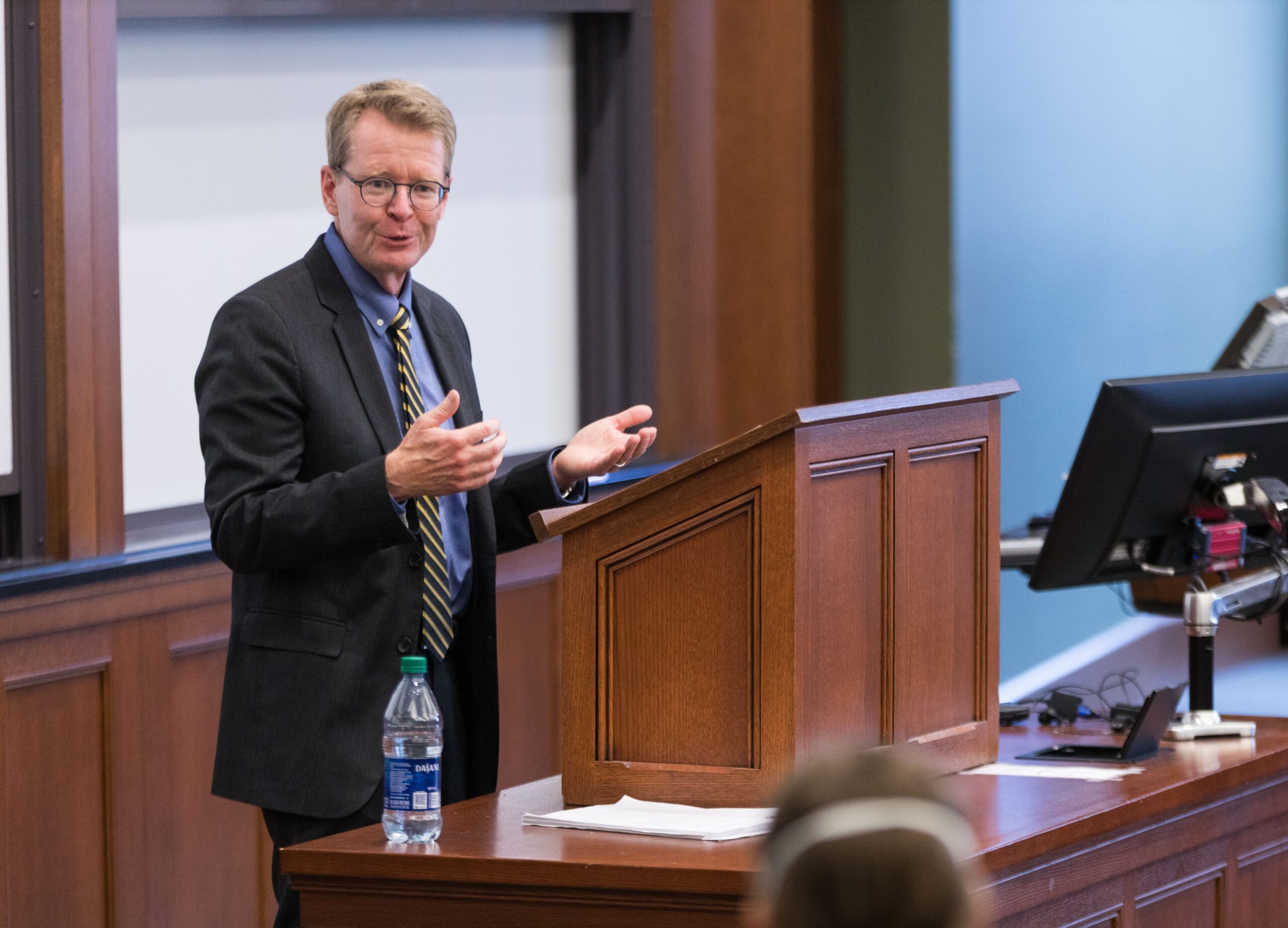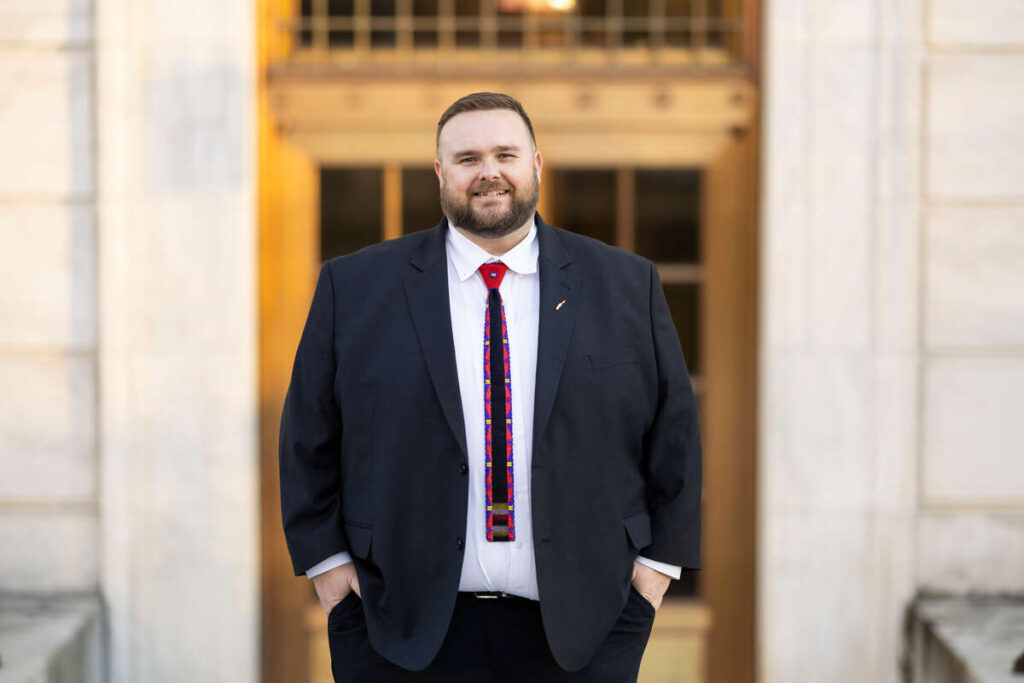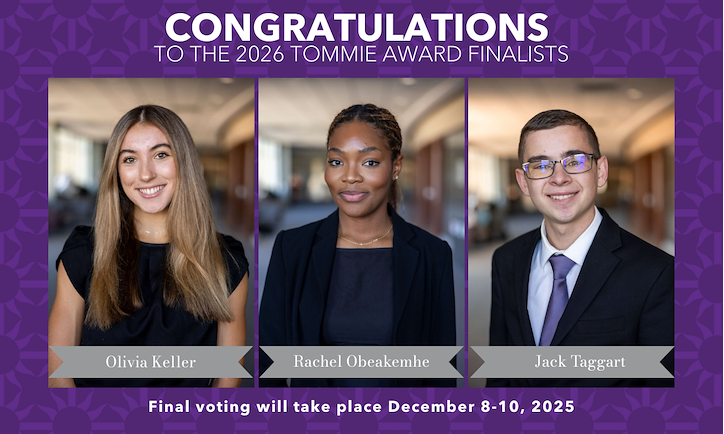Professor Michael Stokes Paulsen is known for shining a light on obscure corners of constitutional history, often employing his irreverent wit in journal articles like “Is West Virginia Unconstitutional?” and “Let’s Mess with Texas.”
Though Paulsen’s writing can be playful, he almost always has a serious purpose: to illuminate a neglected or misunderstood aspect of the law or our constitutional history. Over his career, this approach has gained him respect among colleagues as an innovative thinker whose scholarship is grounded in careful analysis.
But until now, none of his scholarly articles had fueled a national debate or spawned legal cases that went all the way to the Supreme Court. “The Sweep and Force of Section Three,” co-authored with William Baude, about a little-known provision of the 14th Amendment that disqualifies oath-taking insurrectionists from holding office, did all that, even before the article was officially published.
Informed by thorough historical research and examination of the text as it was originally understood, the article is a testament to Paulsen’s determination to follow the truth wherever it leads.
The making of a scholar
Paulsen is now widely considered a leading constitutional scholar, but as a young man, he wasn’t sure law was the right path.
He arrived at Yale Law School in the fall of 1982 as a transfer student from Northwestern University who had also enrolled in Yale Divinity School. He had questions about the Bible, theology and his purpose in life. But first, he needed to find a place to live.
As it turned out, a second-year law student named Akhil Reed Amar also needed a roommate. Amar, a self-described liberal, and Paulsen, a conservative, “became sort of an odd couple of law-school roommates,” Paulsen said. “We would argue about constitutional law at 2 in the morning.”
They sharpened each other, said Amar, now a professor at Yale and one of the country’s most-cited legal scholars, by trying out their best arguments on each other, discovering weaknesses, and revising their positions accordingly. “That’s what good lawyers do,” he said. “You know, every night was a moot court!”
“I loved my time at Yale,” Paulsen said. Professors like Robert Bork favored an originalist approach to interpreting the Constitution, focusing on the original public meaning that the text had when it became law, and that approach struck a chord with Paulsen. The Federalist Society had just been established, challenging what its founders viewed as judicial overreach and liberal ideology; soon he was leading Yale’s chapter.
“I decided I really did want to be a lawyer of some sort,” he said, and after graduation headed to Washington, D.C. He spent six years there, working two different stints for the Department of Justice. In between, he combined his interests in religion and law to work as a lawyer for a Christian legal group.
In 1991, Paulsen secured his first faculty position, at the University of Minnesota. By then, he had met and married Kristen Stokes (he adopted her family name as his middle name), an international economist who did trade negotiations for the U.S. government. It was a homecoming of sorts –Paulsen was born in Minnesota and grew up in Wisconsin, and Kristen also had Midwestern roots.
Academia suited him immediately. Paulsen started churning out journal articles while juggling teaching duties and providing pro bono counsel on religious liberty issues. Within five years, he won the Paul M. Bator Award from the national Federalist Society, given to a scholar under 40.
A leap of faith
Soon after the University of St. Thomas decided to reopen its School of Law in 1999, Paulsen began thinking about a move. Attracted by the school’s faith mission, and a number of friends who were involved in its founding, he was intrigued by the possibility of being part of a start-up that would support his pro-life advocacy. He came over first as a visiting professor in 2003-04 and joined the permanent faculty in 2007.
Since joining St. Thomas, Paulsen’s scholarship has become increasingly focused on the U.S. Constitution. He co-authored a new casebook on the Constitution (now in its fifth edition) but may be
PRESIDENT ROB VISCHERMike Paulsen is the best type of scholar because he makes you think hard about your own assumptions when you engage his arguments. He’s a model of intellectual rigor and spirited advocacy for our students, and a great gift to the St. Thomas
community.”
most proud of The Constitution: An Introduction (2015), a book for general readers that he and his son, Luke, wrote over nine summers at the family’s cabin on Lake Vermillion, starting when Luke was just 13. “I think it’s the best thing I’ve ever written,” Paulsen said, crediting Luke for editing out his father’s tendencies to lapse into “professoritis,” and making the ideas accessible.
Paulsen has been recognized for his contributions at St. Thomas, winning the Dean’s Awards for Scholarship (2011, 2019 and 2024) and Teaching (2015). University President Rob Vischer said, “Mike Paulsen is the best type of scholar because he makes you think hard about your own assumptions when you engage his arguments. He’s a model of intellectual rigor and spirited advocacy for our students, and a great gift to the St. Thomas community.”
That intellectual rigor has included a willingness to face criticism. In fact, he originally connected with his future co-author, William Baude, after the younger scholar published an attack on one of Paulsen’s signature articles soon after graduating from Yale Law School.
Despite that public disagreement, the two started an email correspondence. When they finally met at a conference, years later, Baude said, Paulsen greeted him with a hug.
Now a law professor at the University of Chicago, Baude won the Bator Award in 2017 and is one of the most-cited legal scholars of his generation.
“We became fast friends,” Paulsen said. “We apply very similar methodology, but sometimes disagree as to results, and argue back and forth, cheerfully, about the things we disagree on. We very much respect each other.”
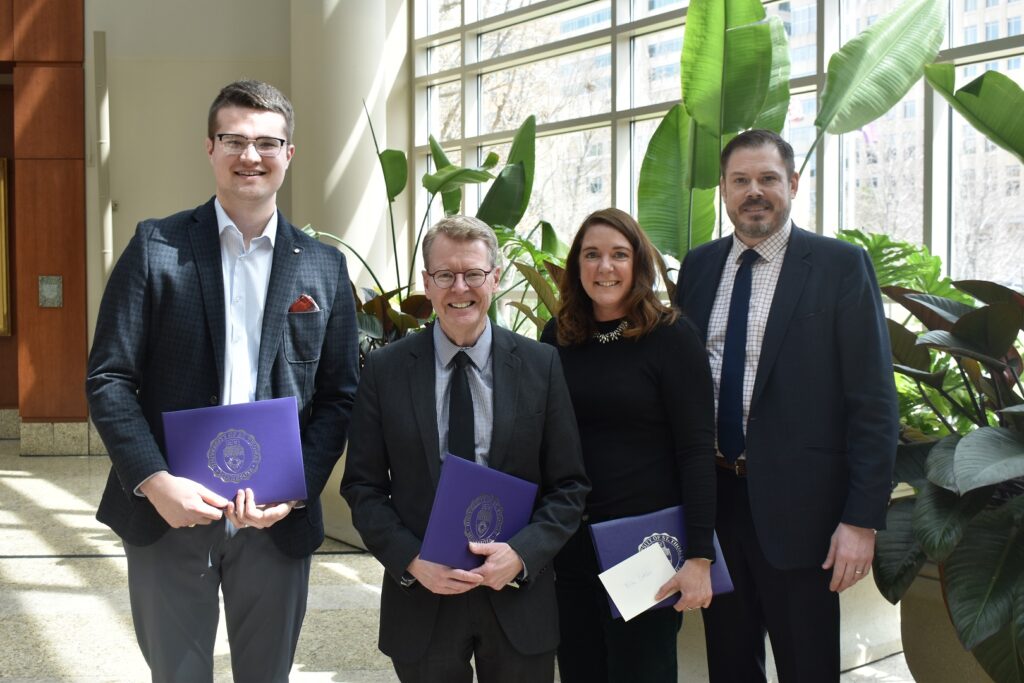
and Force of Section Three.” Mike Petschel ’24 J.D. (far right) nominated them for the award.
‘A short article’
After the attack on the U.S. Capitol on Jan. 6, 2021, that disrupted the certification of the 2020 presidential election, some commentators suggested that President Donald Trump’s actions constituted engaging in an insurrection, which under Section Three of the 14th Amendment disqualified him and others from seeking future office.
The 14th Amendment was enacted in 1868, soon after the Civil War. Section Three aimed to block former Confederate leaders from holding government offices during Reconstruction, barring anyone who had previously taken an oath to support the Constitution but had “engaged in insurrection or rebellion” against the Constitution, or “given aid and comfort to the enemies thereof.”
After Reconstruction ended, however, Section Three was mostly forgotten.
“What initially attracted me,” Paulsen said, was the question: “Does an 1868 provision of the Constitution that everybody has left for dead still have Constitutional force?” He started poking around and eventually approached Baude about writing “a short article.”
Baude agreed. “It seemed like a part of the Constitution that a lot of people hadn’t paid attention to, and suddenly, it was in the public eye, and it needed some cold, sober analysis.”
As originalists, that meant understanding what the drafters of Section Three meant when they used the terms insurrection and rebellion, which entailed poring over 1860s legal dictionaries and Abraham Lincoln’s speeches.
After years of working through the issues, Baude and Paulsen concluded that Section Three did indeed have force. Their 126-page draft article was posted on the Social Science Research Network (SSRN) website in early August 2023. Shortly thereafter, the SSRN server crashed, as the article was downloaded more than a hundred thousand times.
“We received a deluge of media invitations,” Paulsen said: “Anderson Cooper, Chuck Todd, NBC Nightly News, CNN … and we decided not to do that. We’re not talking heads or commentators or political activists.”
And then, about a month later, came the lawsuits to take Trump off the ballot, most notably one in Colorado, which cited Baude and Paulsen’s article multiple times.
Amar, the Yale professor, said, “It’s the most important article ever written about the 14th Amendment, Section Three.” He also said that without it, those cases would not have been brought.
Paulsen disagreed, in part, saying some lawsuits probably would have happened. “But there was something about two conservatives, two Federalist Society members, originalists, who said, ‘There’s actually something to this,’ that caused some people to sit up and take notice.”
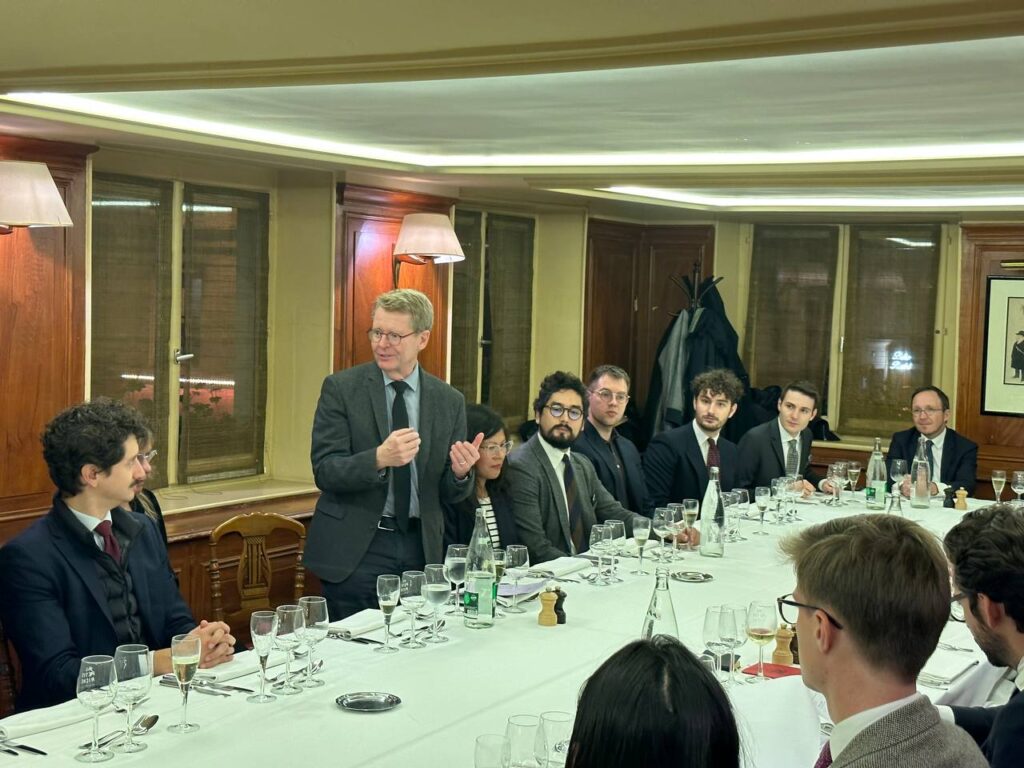
In December 2023, the Colorado Supreme Court ruled that the former president was disqualified from appearing on the state’s presidential primary ballot, and Trump appealed that decision to the U.S. Supreme Court. The Court heard oral arguments on Feb. 8, about 10 days before the University of Pennsylvania Law Review formally published “The Sweep and Force of Section Three.”
On March 4, the U.S. Supreme Court reversed Colorado’s decision, ruling unanimously that states could not disqualify federal candidates under Section Three. A majority opinion went on to say that such disqualifications required legislation from Congress.
Though the outcome was widely expected, Baude and Paulsen remain steadfast in support of their analysis. “Nothing in the ensuing commentary, discussion and litigation has caused us to revise our core propositions,” they wrote in a series of essays published by reason.com in February, prior to the court’s ruling, in which they responded to comments and objections on their paper.
Still, some may wonder if the article was worth doing.
“Oh, absolutely!” Paulsen said. After all, he said, he and Baude didn’t start out with a particular agenda: “We were just intrigued by an interesting set of difficult constitutional questions.” And by exploring those questions, they sparked a national conversation about current-day implications
of a little-known constitutional provision designed generations ago to protect our democracy.
Meanwhile, Professor Paulsen has more to say about the Constitution. The working title of his next article? “The Power to Declare Peace.”
This story is featured in the summer 2024 issue of St. Thomas Lawyer.
